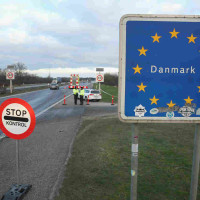Danish lawmakers are to vote today (Tuesday) on controversial legislation that would empower authorities to seize cash and valuables from asylum seekers to help cover their expenses.
The so-called jewellery bill would allow the seizure of valuables worth more than 10,000 Danish kroner (about £1,000).
Items of “special sentimental value” such as “wedding rings, engagement rings, family portraits, decorations and medals” would be exempted, according to the Danish Ministry of Immigration, Integration and Housing. But “watches, mobile phones and computers” could be confiscated, it says.
The legislation has been criticised across the political spectrum, appalling many in the northern European nation, which has a longstanding global reputation for tolerance and promoting liberal, social democratic values.
Denmark’s ruling Liberal Party says the legislation is about ensuring that asylum seekers contribute to the country’s generous welfare state.
“All Danish citizens and refugees coming here receive universal healthcare; you receive education from preschool to university, and you receive elderly care; you receive language training and integration training free of charge, paid for by the government,” Liberal Party spokesman Jakob Ellemann-Jensen told CNN’s Christiane Amanpour last month.
“The only demand that we set to measure this is if you have the means to pay for your housing and for your food — regardless of whether you are a Dane or whether you are a refugee — then you should.”
Similar laws exist in Switzerland and Germany, according to officials there. Dozens of cases were reported in Switzerland of migrants’ assets being confiscated to fund their living expenses, although in Germany it was unclear if, or how widely, the policy was enforced.
Both supporters and critics of the bill say it has more to do with deterring further arrivals of migrants and asylum seekers, who have entered Europe in numbers not seen since World War II.
“We hope this will start a chain reaction through Europe where other European countries can see there’s the need to tighten the rules on immigration in order to keep European culture,” said Martin Henriksen, spokesman for the right-wing Danish People’s Party, which supports the bill.









